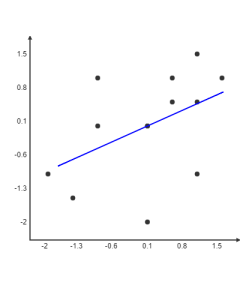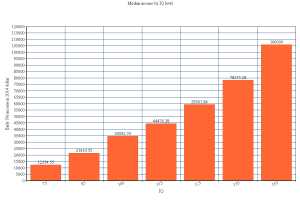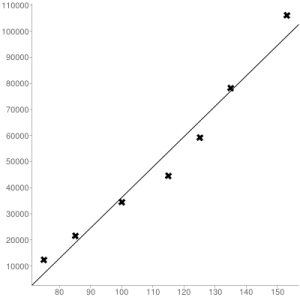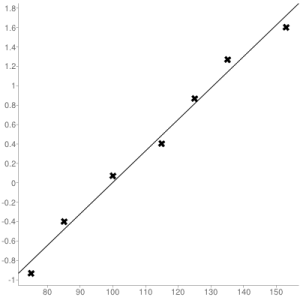In this post, I summarize all that I have learned about the actual test scores of different income levels. In particular, I compare actual psychometric data of seven U.S. economic classes: (1) the homeless, (2) welfare recipients, (3) median Americans, (4) self-made millionaires (5) self-made decamillionaires, (6) self-made billionaires, and (7) self-made decabillionaires, and largely confirm my repeated assertion that average IQ increases by 8-10 points for every ten-fold increase in income, though there may be a few major exceptions to this overall trend. Also, by analyzing the slope of the standardized regression line predicting IQ from income, I find evidence that the true correlation between IQ and income (at least in America) is much higher than the 0.23 reported in a 2006 meta-analysis and even higher than the 0.4 correlation asserted by Arthur Jensen, and may even approach 0.5.
I also find tentative but shocking evidence that the IQ gap between the richest and poorest Americans may exceed an astonishing 70 points!
In this analysis I am limiting myself entirely to test score data so IQ estimates based on ethnic composition or educational achievements of various economic classes are only occasionally mentioned to buttress the actual psychometric results. In several cases, the data is somewhat anecdotal, and speculative statistical inferences are sometimes made.
Technical note
For each economic class, I provide two normalized Z scores; one measuring the median financial success, and one measuring the mean or median cognitive ability. The normalized Z scores are just measures of where each economic class ranks (in financial success or IQ) compared to a reference group (in this case U.S. adults in general, or U.S. adults of a specific age). For example a Z of +2.33 means you’re in the top 1%, and a Z of -2.33 means you’re in the bottom 1%. A Z of 0 means you’re right in the middle, etc.
THE HOMELESS: Mean IQ 83 (U.S. norms); IQ 80 (U.S. white norms)

Image found here
Median financial success: 0.09 percentile of U.S. adults (normalized Z = -3.13)
In 2015, roughly 423,750 American adults were homeless on a given night: One in 572 American adults (0.17%). Thus it can be estimated that the median homeless person is financially in the bottom 0.09%
Median cognitive ability: 12.8 percentile of U.S. adults (normalized Z = -1.17)
A 2004 study found that 90 homeless men living in a large shelter in Milwaukee, Wisconsin, had a mean WASI full-scale IQ of 83.92 (standard deviation = 15.24). The WASI was published in 1999, and this study was published in 2004, so we should subtract 1.5 points for old norms which are thought to expire at a rate of 0.3 points a year (the Flynn effect), so the homeless likely have a mean IQ of 82.5 (U.S. norms) or about 80 (U.S. white norms).
One problem with this study is that 81% of the sample was black (much higher than the 45% among homeless Americans in general) and these tend to score lower on IQ tests, at least in the general population, however a UK sample of homeless obtained virtually identical scores on the WASI, despite being 96% white.
In the UK study, the WASI full-scale IQ distribution of the homeless has a mean of 84.3. In this study, published in 2011, the WASI norms were by now even more outdated, so we should probably subtract 3.6 points for old norms, so this homeless sample have a mean IQ of 80.7 (U.S. norms) or about 78 (U.S. white norms).
Given the IQ of 80.7 (U.S. norms) among the the virtually all-white U.K. homeless sample, the IQ of 82.5 among the mostly blacks American sample is unlikely to be deflated by race, thus 83 is considered the best estimate of the American homeless.
WELFARE RECIPIENTS: Mean IQ 92 (U.S. norms); IQ 90 (U.S. white norms)

Image found here
Median financial success: 8.5 percentile of U.S. adults (normalized Z = -1.4)
About 17% of U.S. adults between age 18 and 64 receive public assistance. Thus the median welfare recipient can be thought of as in the bottom 8.5% financially.
Mean cognitive ability: 30 percentile of U.S. adults (normalized Z = -0.53)
It’s common knowledge in psychometric circles that reading comprehension tests are statistically equivalent to IQ tests, and a literacy study found that about 2/3 to 3/4 of adult welfare recipients (about 71%) have what’s classified as Level 1 or Level 2 literacy. By contrast, 1/2 of the general adult population are at these levels.
Since by definition, 1/2 of Americans have IQs below 100, it can be deduced that 71% of welfare recipients have IQs below 100. In a normal distribution, the 71 percentile is 8 IQ points (0.53 sigma) above the mean, so if IQ 100 is the 71 percentile among welfare recipients, the average welfare recipient should have an IQ 8 points less.
In other words, American welfare recipients average IQ 92 (U.S. norms) or about 90 (U.S. white norms).
Some might object that my analysis falsely assumes welfare recipients have the same IQ variance as the general U.S. population, but the above cited studies of the homeless suggest that poor Americans do indeed have a similar variance to Americans on the whole.
MEDIAN AMERICAN: Mean IQ 100 (U.S. norms); IQ 97-98 (U.S. white norms)

A house fit for the median American. Image found here
Median financial success: 50th percentile of U.S. adults (normalized Z = 0)
By definition, the median American is at the 50th percentile financially.
Median cognitive ability: 50th percentile of U.S. adults (normalized Z = 0)
By definition, the median American is at the 50th percentile cognitively.
SELF-MADE MILLIONAIRES: Mean IQ of 118 (U.S. norms); IQ 117 (U.S. white norms)

A house fit for a millionaire. Image found here
Median financial success: 99th percentile of Americans in their 50s (normalized Z = +2.33)
According to the 2000 book The Millionaire Mind by Thomas J. Stanley, which reported on a survey of 773 millionaires (defined here by household, not individual net-worth), the typical self-made millionaire is a 54 year-old man. In the year 1998 (when the millionaires were surveyed), it took an individual income of about $340,000 to make the top 1% for 52-58-year-olds. The surveyed millionaires had a median income of $436,000, but because this was household income, their spouses likely contributed, so in individual income they were likely not much higher than the top 1%
Mean cognitive ability: 88th percentile of U.S. adults (normalized Z = +1.2)
The average self-reported SAT score of the millionaires Stanley survey was 1190, which Stanley adjusted to about 1100 because of self-reporting bias (millionaires who were “A students” were more likely to recall their scores than “C students”). Since 90% of the sample were college graduates it’s likely virtually all took the SAT.
Since the typical self-made millionaire in the sample was 54 as of 1998, it’s likely he took the SAT circa 1961 (when he was 17). According to the book The Bell Curve (page 422), if all American young adults (not just the college bound elite) had taken the SAT in 1960, the average score (IQ 100; U.S. norms) would have been 784. Meanwhile prior to 1974, an SAT score of 1300 was considered Mensa level (IQ 130). Extrapolating from these two data points, the average self-made millionaire has an IQ of 118 (U.S. norms); 117 (U.S. white norms).
SELF-MADE DECAMILLIONAIRES: Mean IQ of 118 (U.S. norms); IQ 117 (U.S. white norms)

Image found here
Median financial status: 99.9th percentile of Americans in their 50s (normalized Z = +3.1)
20% of Stanley’s millionaire sample earned at least $1 million a year in household income, and many of these probably earned much more than that, and presumably the bulk of this was individual income made by by the head of households Stanley surveyed, not their spouses. Anyone in their 50s who has been earning a million a year for a long period of time, likely has, or will have, a net worth over $10 million (decamillionaire status). In the year 1998 (when the millionaires were surveyed), it took an individual income of about $1.25 million to make the top 0.1% for 52-58-year-olds.
Mean cognitive ability: 88th percentile of U.S. adults (normalized Z = +1.2)
Above I noted that millionaires had a mean SAT score equating to IQ 118 (U.S. norms); 117 (U.S. white norms). Because Stanley found virtually no correlation between income or net-worth among the millionaires themselves it might be assumed that the decamillionaires in his sample also averaged IQ 118. Of course if the data was not normalized, the zero correlation might be misleading.
SELF-MADE BILLIONAIRES: Mean IQ 133 (U.S. norms); IQ 132 (U.S. white norms)

Image found here
Median financial success: 99.99993 percentile for baby boomers (normalized Z = +4.8)
About 80 million Americans were born between 1946 and 1964 (the baby boomers). People in this age groups are about 42% of the richest Americans. There are 277 self-made billionaires in America (see appendix A of this document). If we assume 42% of these are boomers, then 116 of America’s 80 million boomers are self-made billionaires, which means the median self-made billionaire boomer is the 58th most prosperous out of 80 million, equating to the 99.99993 percentile.
Mean cognitive ability: 98.6 percentile of U.S. adults (normalized Z = +2.2)
Several boomer billionaires have SAT scores that are apparently publicly known. Bill Gates claims to have scored 1590 and Paul Allen reportedly scored 1600. On the pre-1995 SAT, these scores equate to IQs of about 170. I can no longer find any internet sources reporting Steve Ballmer’s composite SAT scores, but he reportedly scored a perfect 800 on the math section of the SAT which seems to equate to an IQ of 150, but given that he hit the ceiling on the test, and is rumored to be in the same IQ league as Gates himself, this is likely an underestimate. Perhaps the best publicly known measure of his IQ is his performance on William Lowell Putnam Mathematical Competition where he performed even better than Gates. If this source is reliable, Ballmer got one of the 100 best scores on the exam in 1974, but probably not one of the top 45, so let’s split the difference and assume he came in 73rd.
Ballmer was one of the 4,308,000 Americans born in 1956, and assuming almost all of the top math talent from his cohort went on to compete in the 1974 Putman (and whatever shortfall was made up by top foreign talent and by older and younger talent), then Ballmer’s score equates to the top 73 out of 4,308,000 (one in 59,000 level) which equates to an IQ of 162.
Thus at least three of the roughly 116 self-made boomer billionaires in America (2.6%) have tested IQ equivalents of at least 162+. It’s possible some of these scores have been exaggerated, but it’s also possible there are other super brilliant self-made billionaires with unknown high test scores. Both possibilities negate one another, making 2.6% perhaps a reasonable estimate.
In the general U.S. population, the top 2.6% have IQs of 129+, but in the self-made boomer billionaire population, the top 2.6% have IQs of 162+. This suggests their entire bell curve is shifted 33 IQ points to the right, so just as the average American has an IQ of 100, the average self-made boomer billionaire should have an IQ of 133, though given that the average is extrapolated from just three outliers (Gates, Allen and Ballmer) who all got rich from one company (Microsoft), it should be interpreted with great caution. Nonetheless, it is roughly consistent with research showing that 43% of self-made billionaires attended colleges indicative of top 1% ability (IQ 135+) (see table 1 of this document) and is also roughly consistent with the ethnic composition of the Forbes 400 richest American list, though there are some anomalies.
Some might object that my estimate for the average IQ of self-made boomer billionaires assumes the super rich have the same IQ variance as the general U.S. population, however a study of the homeless (cited way above) found that even folks at the economic extreme have a standard deviation of 15, like Americans as a whole.
SELF-MADE DECABILLIONAIRES: Mean IQ 151 (U.S. norms); IQ 151 (U.S. white norms)

A home fit for a decabillionaire. Image found here
Median financial status: 99.99999th percentile of baby boomers (normalized Z = +5.23)
Of the 80 million Americans baby boomers, only 13 were self-made decabillionaires in the Oct 19, 2015 issue of Forbes magazine, so the median self-made decabillionaire boomer is the 6.5th most prosperous person in that age group (one in 12.3 million)
Mean cognitive ability: 99.97 percentile of U.S. adults (normalized Z = +3.4)
Of the 13 self-made decabillionaire boomers, at least three (23%) reportedly have test scores equating to IQs of 162+ (Gates, Allen and Ballmer as mentioned above).
If we assume that the IQs of self-made decabillionaire boomers are roughly normally distributed with the same variance as in the general U.S. population (see above), then the fact that 23% have 162+ IQs implies an average IQ of 151, though given the small number of data points, this could just be a fluke.
But it’s worth noting that self-made decabillionaires have perhaps roughly double the rate of elite college attendance as U.S. self-made billionaires in general. Futher, when I analyzed the ethnic and racial background of self-made decabillionaires in 2009 (all generations) it implied a mean IQ of about 150.
Despite this corroboration, an IQ of 151 is so incredibly high that it should still be considered tentative. And even assuming its veracity, it may only apply to decabillionaires of the baby boomer cohort and younger. Older decabillionaires came of age before the rise of high tech and big data, and thus may not have needed anywhere near as much IQ to get rich.
One might not think an IQ of 151 is that extreme for elites given that SAT IQ equivalents this high are not uncommon at the most elite colleges in America, however it’s worth repeating yet again that the IQs of elite college students will regress precipitously when they move from the SAT (the test that selected them) to a neutral IQ test. By contrast, decabillionaires were mostly selected by the market, and only partly by their SAT scores creating opportunities, so unlike Ivy League students, their SAT IQ equivalents are perhaps not inflated by selection bias.
Summary
Below is a summary of the data in bar graph form:
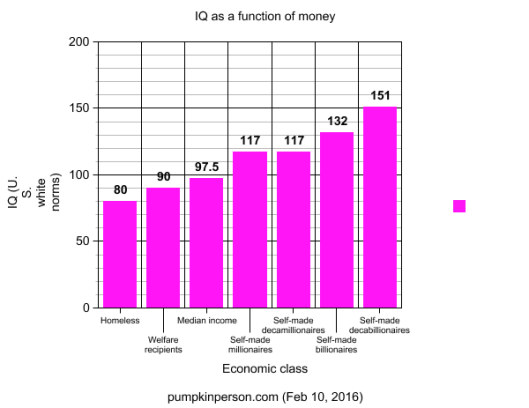
Below is a summary of the above data in table form.
| economic class | median earned income | median wealth | financial success (normalized u.s. z for age grouping) | iq (u.s. z) | iq (u.s. norms) | iq (u.s. white norms) |
| self-made decabillionaires | 10 figures | 11 figures | +5.23 | +3.4 | 151 | 151 |
| self-made billionaires | 9 figures | 10 figures | +4.8 | +2.2 | 133 | 132 |
| self-made decamillionaires | 7 figures | 8 figures | +3.1 | +1.2 | 118 | 117 |
| self-made millionaires | 6 figures | 7 figures | +2.33 | +1.2 | 118 | 117 |
| median income | 5 figures | 5 figures | 0 | 0 | 100 | 97-98 |
| welfare | 4 figures | 4 figures | -1.4 | -0.53 | 92 | 90 |
| homeless | 3 figures | 1 figure | -3.13 | -1.17 | 83 | 80 |
For every ten-fold increase in income, mean IQ increases 8-10 points
The simplest way to think of the IQ income relationship is that for every ten-fold increase in income, average IQ increases 8-10 points (U.S. white norms). Of course there are some major anomalies. Self-made decabillionaires are 10 times more prosperous than self-made billionaires, yet appear to score 19 IQ points higher, though these numbers are tentative given limited data. Meanwhile self-made decamillionaires are ten times more prosperous than self-made millionaires, yet appear, based on Thomas Stanley’s research, to be equally intelligent. One possible reason for this is that the the correlation between IQ and money is partly mediated by years of education, but once you have enough education to be a millionaire (i.e. law school or medical school), even more schooling doesn’t help much. and may even have opportunity costs.
These anomalies notwithstanding, when I graphed average IQ (Y axis) as a function of income (number of figures earned per year)(X axis), there was a nice linear relationship overall: IQ (U.S. white norms) = 9.487319(number of figures) + 52.57971

Standardized regression slope & correlation coefficient
I also graphed average IQ as a function of money again, but this time expressed as normalized Z scores, with average IQ of the seven economic classes on the Y axis, and median financial success on the X axis:
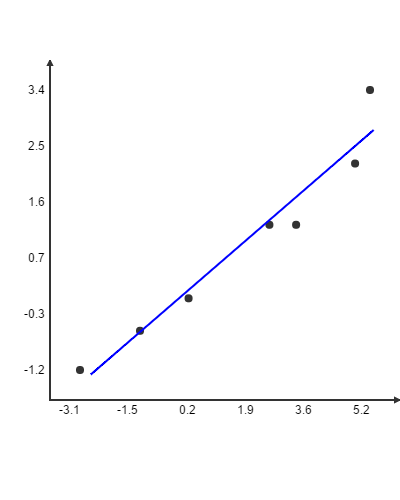
IQ Z score = 0.489421(financial normalized Z score) + 0.135804
As the above graph shows, there’s a virtually perfect (r = +0.97) correlation between economic class and mean/median measured intelligence, when both variables are expressed as normalized Z scores.
Note, this near-perfect correlation between median financial success and mean IQ should not be confused with the correlation between individual IQ and individual financial success. The former is known as as an “ecological” correlation commonly used in epidemiological research, and tends to be higher because individual level variation cancels outs. However because the Z scores are based on the normalized distributions of individuals, the slope of the regression line (+0.49) will equal the individual level correlation.
The actual scatter plot of a random group of individuals (with IQ Z on the Y axis and income Z on the X axis) would probably look as follows:
Notice first that the range of Z scores on both the X and Y and axis is much less. That’s because most people in a random sample of Americans are ordinary in both income and IQ. Note also the enormous variation around the line of best fit.
Now if you extended the range of X and Y much much further, and if you plotted the mean Y for every X, instead of every Y for every X, you should get a scatter plot that looks very much like the ecological scatter plot.
But note that in both the the ecological scatter plot, and the individual scatter plot, the slope should be the same because the line of best fit can be thought of as a line connecting the average Y of a given X, so graphing average Ys instead of individual Ys, does not change the line of best fit, it simply eliminates almost all the scatter around it.
Discussion
A correlation of 0.49 is more than double the 0.23 correlation between IQ and income reported in a 2006 meta-analysis by Tarmo Strenze and nearly triple the 0.16 correlation between IQ and net-worth found in a 2007 study by Jay L Zagorsky, however it is similar to the 0.4 correlation between IQ and income asserted by authoritative Arthur Jensen in his 1998 book The g Factor.
Why did my indirect method (regression slope analysis) result in double the correlation found by Strenze’s meta-analysis of direct studies of IQ and income?
Many studies are based on individual income instead of household income. Because many women (and some men) choose not to work outside the home, their individual incomes are technically zero, but they should not be considered the equivalent to a homeless person with zero income, because they are in fact working in the home and thus earning at least some of their household income. Because there’s no agreement on how to quantify such indirect forms of income, it’s not counted which greatly limits the IQ-income correlation. Using household income instead of individual income seems to result in a higher correlation between IQ and income (+0.37) but even this is an imperfect solution, because all adults within a household don’t contribute equally to the household income.
In addition, many studies use only a single year’s income which is obviously quite unreliable, since massive income fluctuations can occur from year to year.
In my analysis, both of these problems were sidestepped because data points were collected primarily from head of households (self-made millionaires, self-made billionaires) or non-households (the homeless) so you didn’t have to worry about how to deal with indirect income (i.e. the spouse of a millionaire who technically earns nothing, but earns her million dollar life by being a good wife).
Also, my analysis focused on fairly stable economic classes (homeless, welfare, millionaires, billionaires) that reflect lifelong patterns of financial success, and not just a single year’s income.
All this may explain why I found a much higher IQ-income correlation than is usually reported.
A reader informed me of an excellent analysis by Dalliard of Human Varities who found that in a large representative sample of Americans in their 30s and 40s, a single year’s income correlated 0.31 with IQ, but averaging income over many years increased the correlation to 0.36. When Dalliard looked at the correlation in only men (thus, also sidestepping the complication that many women earn their lifestyle as wives instead of through direct income), the correlation leaped to 0.48 (virtually identical to the 0.49 correlation I also found by sidestepping these two problems).

